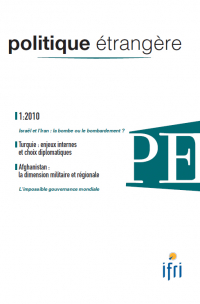Turkey: Internal Issues and Diplomatic Challenges Politique étrangère, Vol. 75, No. 1, Spring 2010
The Lisbon Treaty was meant to mark the dawning of a new era for the EU. But as this issue of Politique étrangère demonstrates, the present outcome, which is only in part the result of the Treaty, is far from satisfactory.

The question of Turkey, addressed in the first section of this issue, is emblematic of the EU's inability to make decisions and formulate a clear idea of its identity and its final destiny. The institutions created in the scope of the Lisbon Treaty will certainly not clarify the situation. States are quite suspicious of the institutional adjustments that are taking place. More specific attention will therefore be given to the implementation of the European External Action Service.
One lurking crisis is difficulty of the EU to work out a mode of governance that fits with the problems of the world today. The example of military intervention in Afghanistan, as shown in the second section of this issue, illustrates the murky waters in which multilateral action takes place. The question today is how to achieve a successful transfer of competence to the Afghan State that will enable a military withdrawal without prompting the country's collapse.
Two other reports in this issue further address the theme dedicated to new institutions of governance: one analysing regional security organizations (through the example of the Shanghai Cooperation Organization) and the other the "global machinery" of the G20.
The field of nuclear affairs is also looking for new governance, beyond the specific agreements made with Iran or Korea and the weakening of the non-proliferation system.
Subscription licence and pay per view : CAIRN
ISSN: 0032-342X


